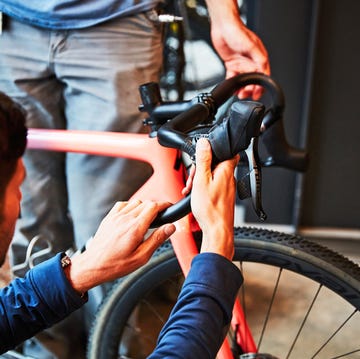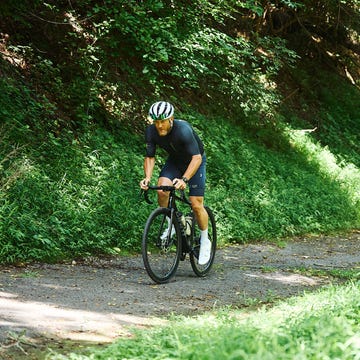A few weeks ago, I wrote about pointless marketing hype. It’s a topic that many riders have a lot of feelings about, and for good reason. If you’ve been riding bikes long enough, you’ve surely lived through a few cycles of brands telling you one thing and then, a few years later, telling you the opposite. But whenever bike industry BS comes up, there’s always one thing people call out time and time again: disc brakes.
Road discs were absolutely a solution for a problem that didn’t really exist. The industry changeover was and is still painful for many riders. Learning to work on a completely new system, with new and often more expensive parts, was and continues to be a source of frustration for plenty of riders. Not to mention the ultimate crime that discs committed by adding roughly a pound of extra weight to bikes over comparable rim brake models. Plus, they can be noisy as heck. And don’t even get me started on the hassle of swapping wheelsets with disc brakes.
Perhaps worst of all, disc brakes made road bikes kind of ugly. They’ve come a long way aesthetically, but early disc road frames looked chunky and almost misshapen compared to their rim brake counterparts, particularly until the flat-mount standard was adopted. Still, a few disc brake road bikes tug at my heartstrings quite the same way as a sleek, classic, rim brake build.
But I’ve realized recently that there’s no way, given the choice, that I’d want to go back to riding rim brakes.
There are a few reasons for this. Perhaps the biggest is that hydraulic disc brakes just freakin’ work better. By eliminating variables like rim and brake track material, whether it’s wet or dry, disc brakes deliver the same consistent performance each time you pull the levers. As much as I enjoy arguing about bike parts on the internet, at this point, the massive improvement in braking isn’t really up for debate (at least when it comes to hydraulic systems).
Disc brakes have also opened up frame design. Even pure road race bikes now have tire clearance that would formerly classify them as all-road or gravel bikes. Typically, my road tires measure around 29 to 31mm, depending on the rim and tire combination, and I love the flexibility it gives me. Rim brake frames, on the other hand, tend to max out around 28mm—and if you’re on an older frame, you might be stuck with 25mm or smaller.
Often, there’s something important that gets lost in the disc-vs.-rim discourse: If you’re satisfied with your bike and its performance, then keep riding it! No one is forcing you to switch. My job as a tech writer isn’t to convince you to buy new stuff—it’s to tell you about the new stuff, analyze if it works well or not, and explain what kind of rider may or may not enjoy it.
So if I was covering disc brakes from scratch, what kind of rider would I say should consider going disc? To start, riders who want rock-solid and consistent braking performance regardless of conditions or rim material. If you often ride in crappy weather, disc brakes also eliminate the rim as a wear item. Riders with smaller hands or lower grip strength might also benefit because hydraulics can dramatically reduce the force needed to apply full braking force. And I can’t overstate the comfort and speed you get from being able to run 30mm (or larger) tires at a reasonable tire pressure.
Watch: 5 Awesome Mountain Bikes I Want to Ride in 2024
But like any product, disc brakes have tradeoffs. They’re more expensive and have a bit of a learning curve if you’re moving from rim brakes, which can lead folks to find them to be extra finicky due to their tight clearances. Then again, everything on a bike is complicated and finicky until you learn how to properly tune, maintain, and service it. Plus, at this point, I’ve gotten used to the superior stopping power, and like many that have moved over, I don’t plan on ever going back.
Test Editor Dan Chabanov got his start in cycling as a New York City bike messenger but quickly found his way into road and cyclocross racing, competing in professional cyclocross races from 2009 to 2019 and winning a Master’s National Championship title in 2018. Prior to joining Bicycling in 2021, Dan worked as part of the race organization for the Red Hook Crit, as a coach with EnduranceWERX, as well as a freelance writer and photographer.















